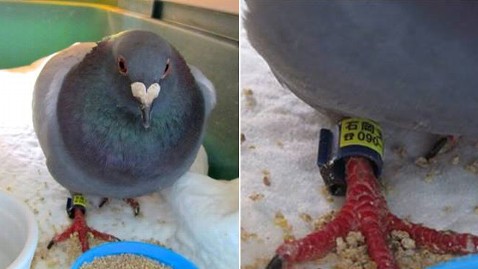Wayward Pigeon Makes Trans-Pacific Journey

Image Courtesy of Mountainaire Avian Rescue Society
Talk about a bird that has something to flap about.
A Canadian avian rescue organization says a Japanese racing pigeon made an unscheduled, trans-Pacific journey from the northern island of Hokkaido before landing in British Columbia's Vancouver Island last week.
The wayward bird was found on a Canadian air force base, exhausted and emaciated with a parasite but has since been nursed back to health by veterinarians at Mountainaire Avian Rescue Society.
MARS founder Maj Birch said the animal was so skinny it had lost most of its muscle mass.
"When they're flying around they become dehydrated and weakened," she said. "He may have landed on ships where there was no food, maybe rode on the ship until he felt like he could fly some more."
Owner Hiroyasu Takasu tells ABC News the 1-year-old pigeon set off on his first race southeast of Sapporo May 10, along with 8,000 other birds. Only 20 percent of the fleet completed the 600- mile race, including the baby's mother, who took the top prize, Takasu said.
But the stout pigeon had bigger plans in mind, flying 5,000 miles across the Pacific.
Canadian rescuers spotted Takasu's phone number on a tag attached to the bird's leg, and contacted him.
"I was so relieved he was found alive," Takasu said, adding that he'd assumed the pigeon was dead. "[Birds] usually reach their limit in a week, with no food or water. This is a superior pigeon."
Despite that, Takasu declined an offer by Birch to return the creature by plane, saying he worried about the toll additional travel would take on the bird's already weak health.
Birch said Canadian officials initially requested the bird be euthanized, because he didn't have the proper paperwork. When she explained the bird "had traveled on his own," they classified him as a "migratory bird," sparing him his life.
The Mid-Island Racing Club in Nanaimo offered to adopt him, and is now considering breeding the wayward bird in hopes of developing a new generation of long-distance racers.
Pigeons use the strength of Earth's magnetic field to navigate and have a unique ability to return to their homes, even after they are dropped off hundreds of miles away. But younger birds often tend to get lost, Birch said.
"We've had other racing pigeons from Japan [land here] before," Birch said. "This time, it was like 'Oh, here's another one."
A veteran bird trainer, 73 year-old Takasu has been raising racing pigeons for four decades now. He currently owns more than 100 birds on his property in Ibaraki Prefecture but said he'd never heard of a pigeon traveling so far on its own.
The animals often don't make it past 2 years old, in part, because they're plucked by larger birds such as falcons, Takasu said.
"We did not even have a name for this one, because we only give names to birds that return home," he said. "I am so sorry for burdening [rescuers] in Canada."